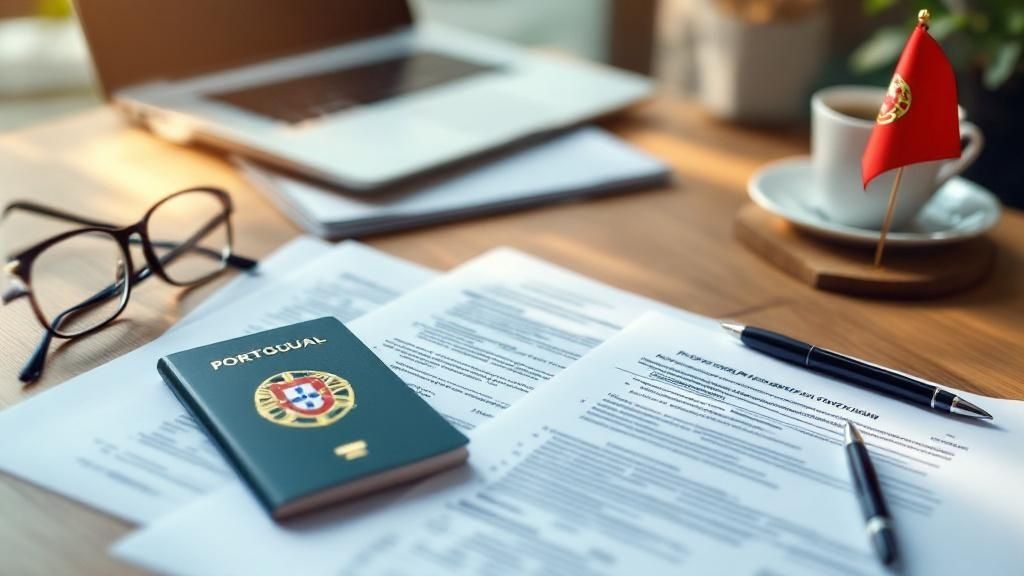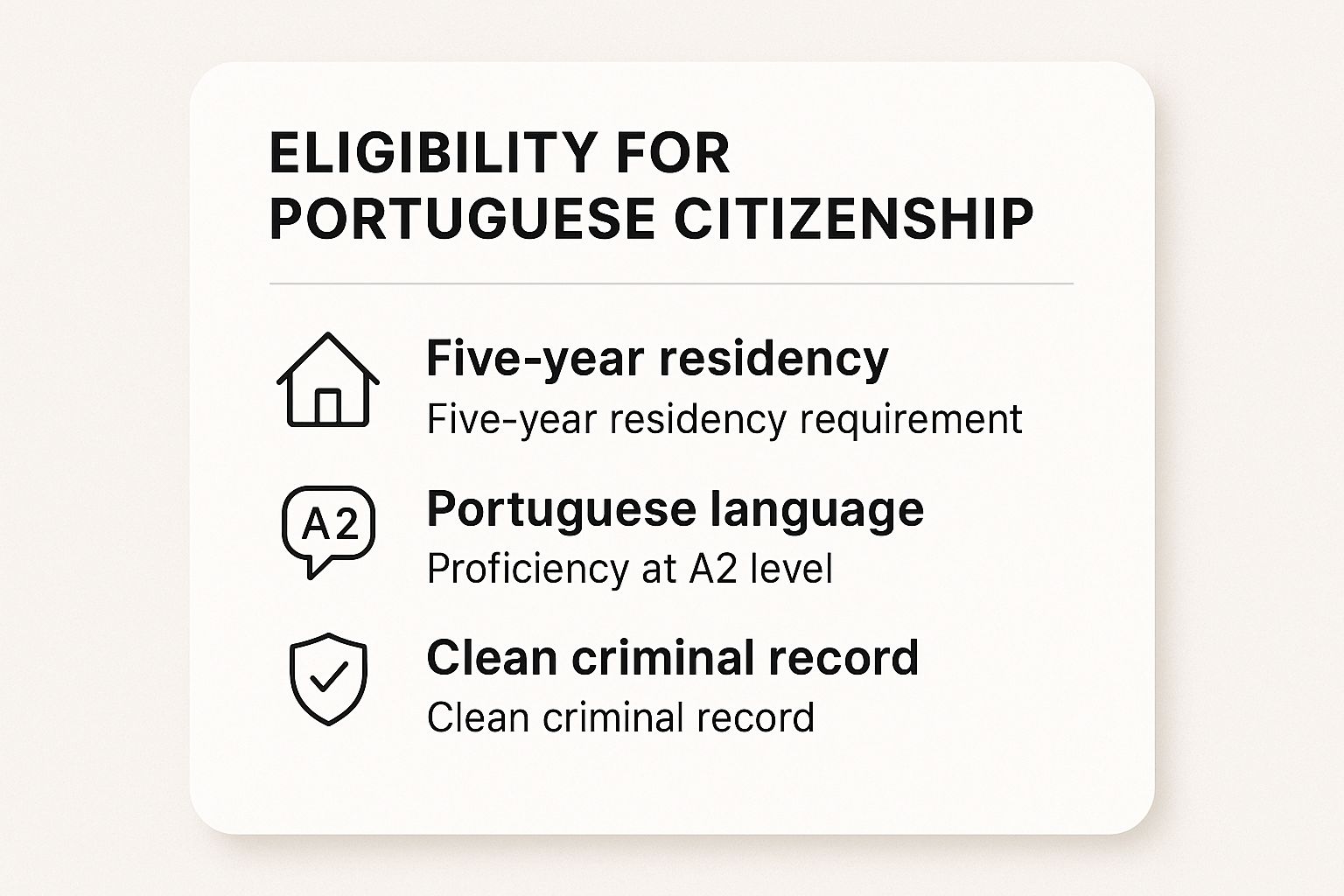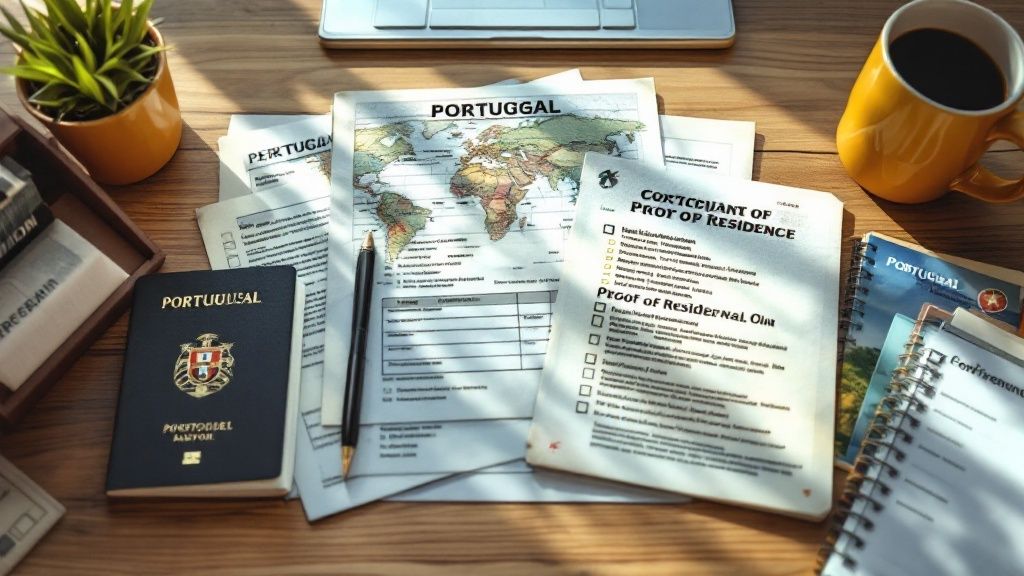How to Apply for Portuguese Citizenship

So, you're thinking about becoming a Portuguese citizen. It's a fantastic goal, and while it might seem like a mountain of paperwork, the path is actually quite straightforward for most people.
At its core, the process boils down to three key things: you'll need five years of legal residency, a basic A2-level handle on the Portuguese language, and a clean criminal record. From there, the specifics depend entirely on your personal situation—are you applying based on how long you've lived here, your family tree, or your marriage?
Your Path to Portuguese Citizenship Starts Here
Getting that Portuguese passport is a game-changer. It unlocks the freedom to live, work, and travel across all 27 EU member states. And while the thought of dealing with government bureaucracy can be intimidating, Portugal's requirements are refreshingly more approachable than many of its European neighbors. My goal here is to cut through the legal jargon and give you a clear, step-by-step guide.
For most expats I've worked with, the most common route is naturalization after living in the country for a set period. But that's not the only way in. Let's look at the main options:
- Naturalization via Residency: This is the go-to path for anyone who has been a legal resident in Portugal for at least five years. If you moved for work, retirement, or simply a change of scenery, this is likely your route.
- Citizenship by Descent (Ancestry): Got a Portuguese parent or grandparent? This could be your ticket. This pathway is all about proving a direct family connection to Portugal.
- Citizenship through Marriage or Union: If you've been married to or in a recognized civil union with a Portuguese citizen for at least three years, you can often apply for citizenship directly, bypassing the long-term residency rule.
Core Eligibility at a Glance
Before you start hunting down birth certificates and filling out forms, let's get a clear picture of the absolute must-haves. These three pillars are the foundation of almost every application for citizenship through naturalization.

Think of these three things—residency, language, and good character—as the non-negotiables. They show the Portuguese government that you're not just a visitor but someone who is truly integrated into the community.
Figuring out which pathway fits your life story is the most important first step. To make it easier, I've put together a simple table comparing the main routes so you can see where you fit.
Key Pathways to Portuguese Citizenship at a Glance
This table offers a quick comparison of the most common routes to citizenship, highlighting the core requirements and typical timelines for each.
| Citizenship Pathway | Primary Requirement | Minimum Residency | Key Document |
|---|---|---|---|
| Naturalization | 5 years of legal residency | 5 Years | Residence Permit (Título de Residência) |
| Descent (Grandparent) | Proof of lineage & community ties | Not Required | Grandparent's Portuguese Birth Certificate |
| Marriage/Union | 3 years of marriage/union | Not Required | Marriage Certificate & Proof of Union |
Seeing it all laid out like this should help you pinpoint your exact path. Once you know which route is yours, you can focus your energy on gathering the right documents and meeting the specific criteria—which is exactly what we'll dive into next.
Confirming Your Eligibility for Citizenship

Before you even think about gathering documents or booking a translator, the first and most critical step is figuring out which path to Portuguese citizenship is actually open to you. This is more than just ticking boxes on a checklist. It’s about digging into the fine print that defines each route, because a misunderstanding here can cost you months of wasted time and money.
It's easy to assume eligibility is straightforward, but the reality is that the law is interpreted in very specific ways. Your journey to apply for Portuguese citizenship starts by correctly identifying your route, whether it's through your family tree, the time you've lived in Portugal, or your marriage to a citizen.
Decoding the Naturalization Residency Rule
The most well-trodden path is applying for citizenship after five years of legal residency. That sounds simple enough, but the term "legal residency" has a very precise meaning. The clock doesn't start ticking the moment your plane touches down in Lisbon. It officially begins on the day your first residence permit (Título de Residência) is issued.
For instance, if you came to Portugal on a D7 visa, your five-year countdown starts from the date of your successful AIMA (formerly SEF) appointment when you received your card, not the date you first entered the country. This is a common point of confusion that can easily shift your eligibility date by months.
The type of visa you’re on matters, too. If you’re here on a temporary or student visa, you might find that not all of that time counts toward the five-year requirement in the same way. For digital nomads and remote workers, it's essential to understand how your residency is classified. You can get more clarity by checking out our guide to https://residaro.com/blog/remote-work-visa-europe.
Proving an Effective Connection Through Ancestry
If you're applying through a Portuguese grandparent, a birth certificate alone won't cut it. The law requires you to demonstrate an "effective connection" (ligação efetiva) to the Portuguese community, and this is probably one of the most misunderstood hurdles in the entire process.
So, what does this actually look like in practice? It's not about your annual holiday in the Algarve. The government is looking for real, ongoing ties to the country.
- Language Proficiency: Getting your Portuguese to an A2 level is a massive signal of your commitment.
- Property Ownership: Owning a home in Portugal is a clear financial and personal link.
- Regular Visits: Keep records of your trips to Portugal over the years. A consistent pattern helps build a strong case.
- Community Involvement: Are you part of a Portuguese cultural association or club where you live? This is excellent evidence.
My advice is to start building this portfolio of evidence long before you even plan to apply. Simply saying you love Portugal isn’t enough; you need to show them with concrete proof that you’re an active part of its culture or community.
The Nuances of Citizenship Through Marriage
Being married to a Portuguese citizen for at least three years provides another direct route to a passport, but again, the details are everything. The authorities need to see that your marriage is genuine and ongoing.
Just handing over your marriage certificate often isn't enough. You should be ready to show documentation of your shared life, especially if you haven't been living together in Portugal. Think joint bank statements, property deeds with both your names, or the birth certificates of your children.
This level of scrutiny is there to weed out fraudulent applications, so your best defense is being organized and thorough from the start. Taking the time to understand these specific requirements right now will save you from hitting common roadblocks and put you on the fastest, most direct path to becoming a Portuguese citizen.
Assembling Your Application Documents

A successful citizenship application is built on a foundation of perfectly prepared documents. This isn't just about collecting papers; it’s about making sure each one meets the strict requirements for format, validity, and translation. One small mistake here can lead to frustrating delays, so think of this stage as meticulously building the case for your future in Portugal.
My biggest piece of advice? Start gathering documents the moment you decide to apply for Portuguese citizenship. Don't wait until your five years of residency are up. Some documents, especially those from abroad, can take months to track down and legalize. Starting early is the single best way to avoid a frantic, last-minute scramble.
The Essential Document Checklist
While every application has its own unique quirks, a core set of documents is required for almost every naturalization case. Consider this your master list. Let's break down not just what you'll need, but the small details you absolutely can't afford to miss.
Here’s what you'll almost certainly need to have in hand:
- Your Original Birth Certificate: This isn't just a photocopy. You'll need a long-form or unabridged version that has been recently issued and legalized with an apostille from your home country.
- Criminal Record Certificates: You need to provide one from your home country and from every country where you've lived for more than one year since you were 16. These have a notoriously short validity period, often just three months, so timing the request is everything.
- Proof of Portuguese Language Proficiency: This is your CIPLE (A2 level) exam certificate. It's the non-negotiable proof that you've met the language requirement.
- Your Valid Passport or National ID Card: A clean, legible copy is usually all that’s needed here.
- Your Portuguese Residence Permit: A copy of your current Título de Residência is essential to prove your legal residency status.
Each of these items comes with its own potential pitfalls. For instance, getting an apostilled birth certificate from the US can take several months, involving state-level departments and mail-in requests. You have to plan for that.
Navigating Criminal Record Checks
Getting criminal record checks from multiple countries can feel like a logistical nightmare. The process for getting an FBI background check in the US is worlds apart from how you'd get one in Germany or Japan.
Your best first step is to contact the embassy or consulate in Portugal for each country you’ve lived in. They can give you specific, up-to-date instructions. For a US check, for example, you'll likely need to get your fingerprints taken and submit them directly to the FBI. And because these certificates expire so quickly, I always suggest requesting them about four months before you plan to submit your application. That buffer is a lifesaver.
A critical pro-tip: when requesting documents like an FBI check, order two copies. Mail gets lost, and having a backup can save you from having to restart a two-month process from scratch. It's a small extra cost that provides massive peace of mind.
Once you have these documents, any that are not in Portuguese must be translated. This isn’t a job for a friend who speaks the language; it requires a certified translator who is officially recognized by the Portuguese authorities. The translations must then be legally notarized. Make sure to budget for this, as certified translations can easily add a few hundred euros to your total cost.
Proving Your Language Skills
Passing the CIPLE A2 exam is a huge milestone, and that certificate is your golden ticket. The test evaluates your reading, writing, listening, and speaking skills in European Portuguese. While A2 is considered a basic level, the exam format itself can be tricky. I strongly recommend taking a prep course designed specifically for the CIPLE exam just to get comfortable with its structure.
Register for the exam well in advance. Test centers can fill up surprisingly fast, especially in major hubs like Lisbon and Porto. You’ll get your certificate a few weeks after passing, which you will then include in your final application package.
This whole process involves careful financial planning. The application fee itself is around €250, but that's just the beginning. When you add in costs for legal assistance, official document fees, apostilles, and certified translations, the total can easily climb over €1,000. The processing time for an application typically ranges from one to two years, though this can fluctuate based on your case and current government timelines. You can explore more about these costs and timelines from experts in the field. Find out more about the financial side of your application from Global Citizen Solutions. This investment of time and money is significant, which is why getting the document assembly right the first time is so critical.
Submitting Your Portuguese Citizenship Application
You’ve made it. After all the document hunting, apostilles, and translations, you’re holding a complete file. This is the moment it all comes together. Actually submitting the application isn't rocket science, but knowing your options and being meticulous can save you from frustrating delays down the road.
There are really two main ways to get your application into the system: either you walk it into a designated office yourself, or a lawyer submits it for you through a special online portal. Each path has its own feel and things to consider.
In-Person Drop-Off vs. the Online Lawyer Portal
Which route you take often comes down to your comfort level and whether you've decided to get legal help. If you're managing the process on your own, you'll be submitting your documents in person.
- Conservatória do Registo Civil: Your most common option is a Civil Registry Office (Conservatória) that handles nationality services. The main one is the Central Registry Office (Conservatória dos Registos Centrais) in Lisbon, but others can accept applications.
- National Support Centers: You can also file at a CNAIM (Centro Nacional de Apoio à Integração de Migrantes) office, with locations in Lisbon and Porto.
- Online Portal (For Lawyers): Portuguese immigration lawyers have a dedicated online system for filing applications for their clients. From what I’ve seen, this is usually a faster and more direct route, cutting out the need for physical appointments.
When you submit in person, you'll hand over your neatly organized file and pay the application fee. Right now, that fee is €250. Make sure you're ready to pay it right then and there, usually with a Multibanco card.
That All-Important Application Form
The heart of your submission package is the official form, which for most naturalization cases is the Modelo 1C. It looks simple enough, but a tiny mistake here can stall your whole application. It's entirely in Portuguese, so if you're not fully confident in the language yet, having a native speaker or a legal pro look it over is a very smart move.
I’ve seen applications get held up for the simplest things. Common tripwires include:
- Not writing your full name exactly as it appears on your birth certificate.
- Forgetting to list every single previous address if your specific path requires it.
- Just leaving a section blank instead of writing "N/A" (or the Portuguese equivalent) if it doesn't apply to you.
Seriously, take your time with this. Fill it out on a computer to keep it clean and legible, then print and sign it. A tidy, error-free form makes a great first impression.
Here’s a piece of advice I give everyone: Before you hand anything over, make a high-quality digital scan of every single page in your application file. Having your own complete copy brings incredible peace of mind and can be a lifesaver if a document ever gets questioned or goes missing.
Should You Hire a Lawyer for This?
So, do you actually need a lawyer to file the application? The short answer is no, you can absolutely do it yourself. But hiring an experienced immigration lawyer can be a game-changer, especially if your case has any tricky elements.
It's not just about filling out a form. Think about what they bring to the table.
| Going it Alone | Working with a Lawyer |
|---|---|
| You're responsible for tracking your status. | They handle all communication with the authorities. |
| You have to submit everything in person. | They use the faster, dedicated online portal. |
| You have to figure out official requests yourself. | They translate legal jargon and explain what's needed. |
| Lower cost upfront. | Higher initial fee, but can prevent expensive mistakes. |
A good lawyer does more than just upload documents. They'll do a final, expert review of your entire file to spot potential red flags you might have missed. They make sure it's filed correctly and, crucially, they become your official point of contact. When the state sends a query (notificação), it goes to them, and they know exactly how to respond. That kind of support can turn the long, anxious wait into a much more manageable process.
The Golden Visa Path to Citizenship

For many investors, Portugal’s Golden Visa is the most strategic route to eventually apply for Portuguese citizenship. This popular pathway was built for non-EU nationals ready to make a significant investment in the country. It essentially creates a five-year runway to citizenship, but with one standout feature that makes it incredibly attractive.
The biggest draw? Its remarkably low physical presence requirement. While most residency permits require you to be in Portugal for the better part of the year, Golden Visa holders only need to stay for an average of seven days per year to keep their status active. This gives you the freedom to manage your business and life elsewhere while the five-year clock toward citizenship eligibility keeps ticking away.
Understanding the Investment-to-Citizenship Timeline
The Golden Visa has been a game-changer since it launched back in 2012, giving investors a residence permit that unlocks the ability to live, work, and study in Portugal. The program has pulled in over €7.3 billion in investment, much of which historically went into real estate. While the property investment rules have changed recently, other options like venture capital funds or cultural donations still offer a solid path to residency. You can see the full breakdown of the program's impressive history over on the Get Golden Visa statistics page.
For an investor, the timeline is pretty straightforward:
- First, you make a qualifying investment.
- Then, you get your initial Golden Visa residence permit.
- You'll renew that permit twice over the next five years, making sure to meet the minimal stay requirements each time.
- After five years of legal residency are officially on the books, you're eligible to apply for citizenship.
It’s a clear process that offers peace of mind from day one. Many investors on this track also consider long-term property ownership, and our guide on how to buy a farm in Portugal is a great resource if you're thinking about a rural investment.
From Investor to Citizen: The Final Hurdles
Making the leap from a Golden Visa holder to a citizenship applicant is the final leg of the journey. You've already demonstrated your financial commitment, but now you have to meet the same naturalization requirements as everyone else. This is a crucial point—the investment doesn't get you out of the language test or background checks.
A common mistake I see Golden Visa holders make is assuming their investment waives other requirements. It doesn't. The visa gives you the right to apply for citizenship after five years; it's not an automatic pass. You still have to clear the A2 language exam and provide clean criminal records.
The main challenge at this stage often comes down to paperwork. Since Golden Visa holders spend so little time in Portugal, they might need criminal record certificates from several countries they’ve lived in. Getting all these documents, complete with the correct apostilles and certified translations, can feel like a logistical nightmare.
My best advice? Start gathering all your documents at least six months before your five-year residency anniversary. That way, you'll have everything in order for a smooth and successful citizenship application when the time comes.
Keeping Up with Portugal's Evolving Laws
When you decide to go for Portuguese citizenship, you’re aiming at a target that can sometimes move. The laws and regulations around nationality aren't set in stone; they shift with new policies, demographic trends, and political winds. Keeping a close eye on these changes is a crucial part of a successful application strategy.
This isn’t to cause alarm or suggest the process is a complete guessing game. It’s about arming you with the right information to plan effectively. Knowing about potential legal shifts can help you decide the best time to submit your application or which documents to get in order first, ensuring you’re always playing by the most current rules.
Watching for Key Legislative Changes
Portugal's government regularly reviews its immigration and nationality laws. Lately, there has been a lot of talk about potential amendments that could reshape certain paths to citizenship. For instance, proposals have been floated that might affect how your residency time is calculated or change the specific requirements for certain routes.
One of the most talked-about potential changes involves the popular pathway for descendants of Sephardic Jews, with serious discussions about closing or significantly modifying this option. Likewise, you'll hear chatter about adjusting the five-year residency rule or beefing up integration standards, like the language test. Staying plugged into these conversations is key.
If you're looking at residency as a first step, it's just as important to keep tabs on visa requirements. For more on that, you can check out our detailed guide on the digital nomad visa requirements.
My take on this? Don't see these potential changes as roadblocks. Instead, treat them as strategic intel. If you know a rule change that could affect you is on the horizon, you can act proactively—maybe that means getting your application in sooner rather than later.
What Recent Trends Mean for You
Even with all the discussion about legal reforms, the overall picture for applicants remains incredibly positive. Portugal still has one of the highest citizenship approval rates in Europe.
Yes, changes are being considered for 2025, but even with potential tweaks to residency requirements or the closure of certain routes, core pathways like naturalization remain solid. To give you some perspective, data showed an impressive 98.5% of citizenship applications were approved back in 2022. For more context on this, you can find some great expert analysis at Global Residence Index that breaks down the proposed changes and program viability.
The main thing to remember is that a well-prepared application based on current law has an excellent shot at success. To stay ahead of the curve, follow updates from official sources like the IRN (Instituto dos Registos e do Notariado) and reputable immigration law firms. An experienced immigration lawyer is invaluable here; they’re plugged into the legislative chatter and can give you advice based on what's happening right now.
Frequently Asked Questions
As you get further down the road toward Portuguese citizenship, you're bound to run into some very specific questions. I've found that getting clear answers to these common sticking points can save a ton of stress and help you sidestep simple, but potentially expensive, mistakes. Let's tackle some of the most common questions I hear from applicants.
Does Portugal Allow Dual Citizenship?
Yes, and this is a huge plus. Portugal fully recognizes dual citizenship. When your application is approved, you will not be asked to give up your original citizenship.
This is a massive benefit. It means you can hold a Portuguese passport—and by extension, an EU passport—while keeping the one from your home country. You get all the rights and freedoms of an EU citizen, like the ability to live and work anywhere in the Union, without cutting legal ties to where you're from. Frankly, this flexibility is one of the main reasons so many people choose Portugal.
How Long Does the Citizenship Process Take?
Once your application is complete and officially submitted, you should realistically plan for a wait time of between one and two years. This timeline isn't set in stone, though.
A few things can really affect how long it takes:
- Your specific path: Routes based on ancestry can sometimes take a bit longer because of all the historical documents that need to be verified.
- The office's workload: The particular Conservatória (registry office) handling your file might be swamped, creating backlogs.
- How complex your case is: If you have a more complicated history, maybe with several previous residencies, it might need a closer look.
It’s just smart to think of the two-year mark as a real possibility and make your plans with that in mind. The waiting game is often the hardest part, so patience is key.
Here's a pro tip: the processing clock officially starts ticking the day your application is accepted into the system, not the day you mail it. If they send you a request for more information (a notificação), the clock pauses until they receive your complete response.
What Happens If My Application Is Rejected?
A rejection is tough, but it's not always the end of the line. If your application is denied, you'll get an official letter explaining exactly why. From there, you have the right to appeal the decision in Portugal's administrative courts.
Most rejections I've seen come down to a few common issues: incomplete or incorrect documents, not meeting the residency or language requirements, or having a serious criminal record. This just goes to show how vital it is to be incredibly thorough from the start. Your best defense is to double-check every single document, make sure your translations are properly certified, and be 100% certain you meet every requirement before you submit.
Ready to find your perfect place in Portugal while you plan your citizenship journey? At Residaro, we offer an extensive selection of properties to help you settle into your new life. Explore our listings and discover your dream home in Europe.